Water & Wastewater Improvement Projects
Water and Wastewater Improvement Projects upgrade essential infrastructure to ensure safe water access and efficient wastewater management. These projects include building or renovating treatment facilities, pipelines, and sewage systems, addressing water quality, capacity, and sustainability. They protect public health, meet regulations, and support community growth.
The total value of all water and wastewater improvement grants
managed by COGs over the past three years:
$62,747,295
Area 15 Regional Planning Commission
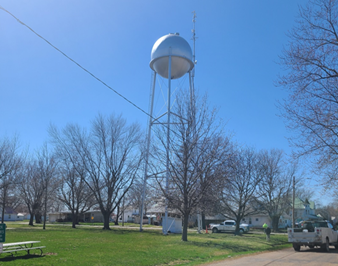
Area 15 Regional Planning Commission has been assisting the City of Birmingham in Van Buren County, to replace it’s existing 50,000 gallon water tower. The current elevated storage tank is 56 years old and no longer in service due to freezing temperatures that caused the standpipe to break.
The lack of water pressure creates a high risk for disruption of water service and the potential for contamination for the entire city when the water supply is interrupted. Working with French-Reneker Engineers a new 75,000 gallon tower has been planned for construction at the same location.
The new water tower will provide improved water pressure, reduce the potential for contamination, and re-establish fire flows. Area 15 Regional Planning Commission assisted the city in applying for a grant and low-interest loan to reduce the cost impact on residents’ water bills.
The total cost of this project is $1,618,700. The city was awarded a $500,000 CDBG grant from the Iowa Economic Development Authority and a $1,118,700 low-interest SRF loan from the Iowa Finance Authority. The new tower is being fabricated and is planned to be in place by the end of 2024.
East Central Intergovernmental Association
East Central Intergovernmental Association (ECIA) has partnered with the City of Maquoketa to administer the significant upgrade of its wastewater treatment facility (initially built in 1950) to comply with discharge limits of their NPDES Operating Permit. To reduce the levels of nitrogen, phosphorus and other nutrients discharged by the plant, the City's engineering consultant, WHKS, identified multiple options and selected the most cost-effective alternative. The project's magnitude still resulted in a $16.280 million investment, including excavation to building and infrastructure construction to turf reclamation. The revitalization was anticipated to require 20 long months, but weather-dependent, it will take the better part of a full two years to complete. Utilizing CDBG ($600,000), EPA ($3,500,000), SRF ($10,384,000) and the City (approximately $1,796,000) funding, the potential economic development impact of the project is very high and crucial for the entire community. Development and population growth momentum are dependent on this project’s success.
East Central Iowa Council of Governments
East Central Iowa Council of Governments (ECICOG) wrote a CDBG Water/Sewer grant application for the City of Marengo to fund improvements to their wastewater treatment facility. Marengo was awarded $500,000 towards the $5.276,000 project in April 2024. The wastewater treatment facility improvements will include aerated lagoon infrastructure upgrades and the addition of UV disinfection to reduce effluent levels of E. coli. It will also include the construction of a new force main to discharge treatment plant effluent into the Iowa River rather than a small stream.
Metropolitan Area Planning Agency
The Metropolitan Area Planning Agency (MAPA) is supporting the City of Carter Lake in Pottawattamie County with the Carter Lake Sewer Lining Project. This project addresses significant issues in the city’s sewer system, including pipe cracks, sags, offsets, and ingrown vegetation, all contributing to increased wastewater volume and higher treatment costs paid to the City of Omaha. To resolve these issues, approximately 50,000 linear feet of the city's 80,000 feet of piping were lined using Cured-in-Place plastic lining. Additionally, 30 manholes received spot repairs, and 15 manholes were coated with Epoxy. The project was funded by a $600,000 Community Development Block Grant (CDBG), with a total cost of $2,239,395. Key partners included USDA.
North Iowa Area Council of Governments
The North Iowa Area Council of Governments (NIACOG) is assisting Charles City with the Charles City Clearwell Water System Improvement Project. This project addresses concerns about the frequent start and stop cycles at the water treatment plant, which could cause equipment fatigue and eventual failure. An engineering report recommended options for treated water storage to ease the operating burden on the plant and prevent system failure. The current storage volume leads to excessive cycling, making it difficult to control the lime feeding process, increasing lime usage, and stressing the equipment. The solution is to add additional ground storage to reduce the number of start-stop cycles and improve system efficiency. The project is supported by a $600,000 grant, with a total cost of $4,579,550. Key partners include the City of Charles City, the engineering firm SEH, Inc., NIACOG, Contractor- Gridor Construction, IEDA-CDBG and IFA-SRF.
Region 6 Resource Partners
Region 6 Resource Partners is assisting the City of State Center with its Water Treatment Improvements Project. The city's water treatment facility, built in 1978, has aging equipment and control systems that have failed. This results in poor water quality with high mineral content, which causes unpleasant odors, taste, and hardness. To address these issues, the best solution is to replace outdated equipment and control systems. The project will include the construction of a new reverse osmosis treatment facility. Region 6 Resource Partners helped secure a $500,000 Community Development Block Grant (CDBG) and a $1,119,760 State Revolving Fund (SRF) construction loan to support this critical improvement.
Region XII Council of Governments
Region XII Council of Governments helped the City of Early secure funding and administer grant funds for construction of the city’s new water treatment facility project.
Prior to this project, the city’s water treatment facility shared a building with the city’s maintenance shop. The project included the construction of the new treatment facility, demolition of the existing facility, and 1,720 linear feet of watermain replacement. The newly constructed facility operates utilizing a reverse osmosis system. The $4.4 million dollar project was financed through a CDBG water/sewer grant, an SRF loan, and a Wastewater and Drinking Water Treatment Financial Assistance Program (WTFAP) grant. The City of Early was awarded $300,000 in CDBG funds, $250,000 in WTFAP grant funds, and a $3.8 million dollar loan from SRF.
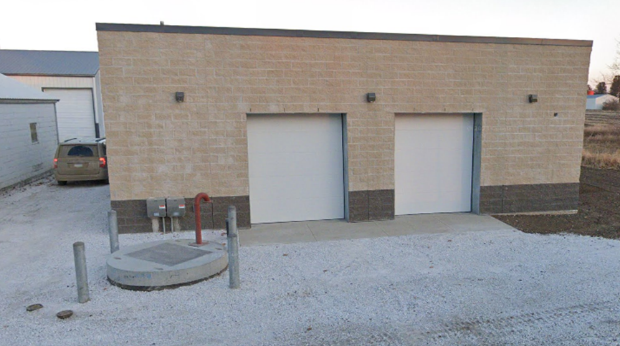
Siouxland Interstate Metropolitan Planning Council
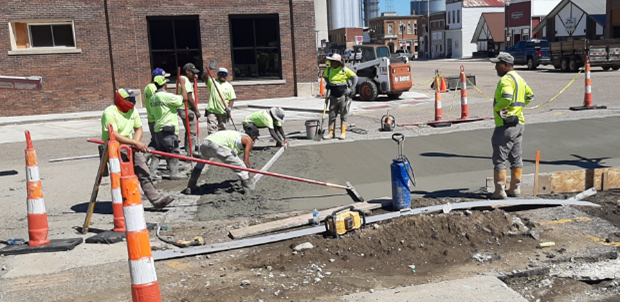
In 2023, the City of Remsen in Plymouth County completed a CDBG-funded project to replace their cast iron water main that was more than 80 years old.
Costly water main breaks were happening frequently, causing loss of water service or low water pressure to agricultural businesses, residences, City Hall, the Main Street business district, and the fire district. With breaks happening more and more frequently, it was only a matter of time before the water main became damaged beyond repair.
With Siouxland Interstate Metropolitan Planning Council's (SIMPCO) assistance, the city and Remsen’s Utility Board secured a CDBG grant of $153,000 to help cover the total project costs of $306,721. The remaining funds were sourced locally from Remsen’s water fund. SIMPCO’s Certified Grant Administrators assisted with the CDBG award management and reporting throughout the project.
Southwest Iowa Planning Council
Southwest Iowa Planning Council (SWIPCO) assisted Villisca with a $1.13 million water improvement project that addressed the City’s aging water distribution system.
The project replaced outdated cast iron mains, non-functional fire hydrants, and lead service lines. It included the installation of 6,205 feet of PVC water main, 200 feet of ductile iron main, 1,140 feet of copper pipe, 10 fire hydrants, 67 service connections, 10 lead service line replacements, 12 gate valves, and 350 new water meters with a radio read system.
These upgrades enhanced water supply, treatment, reliability, and fire safety. Key partners included USDA Rural Development, Garden & Associates, and the City of Villisca.
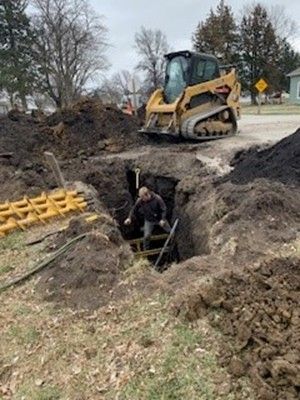
Southeast Iowa Regional Planning Commission
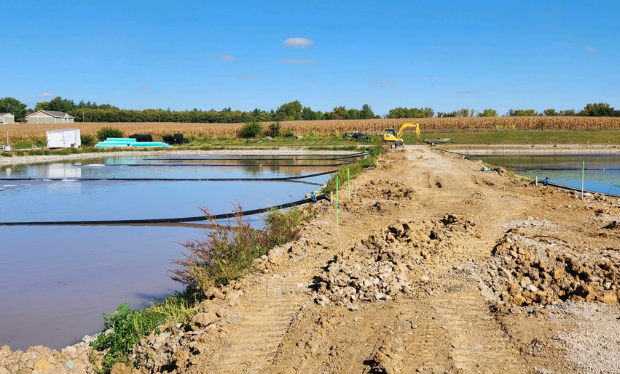
The Southeast Iowa Regional Planning Commission (SEIRPC) is assisting the City of Winfield with the Winfield Wastewater Treatment Facility Project located in Winfield. This project aims to upgrade the city's wastewater treatment plant to comply with ammonia, E. coli effluent limits, and dissolved oxygen requirements.
Additionally, the improvements will enhance the main lift station’s peak flow capacity. The planned upgrades include constructing four Submerged Attached Growth Reactors, building a blower facility, upsizing lagoon intercell piping, removing lagoon sludge, and improving the lift station.
The project has received $500,000 from the Wastewater and Drinking Water Assistance Program (WTFAP) and $1,000,000 in Community Project Funding from the Environmental Protection Agency (EPA). The total cost of the project is estimated at $5.1 million. Key partners include the Iowa Finance Authority (IFA), U.S. Representative Mariannette Miller-Meeks, the EPA, and the State Revolving Loan Fund (SRF), with engineering services provided by HR Green.
Southern Iowa Council of Governments
The Southern Iowa Council of Governments (SICOG) has been involved with five water and sewer projects in the past three years. These have been funded by one or more of the following: CDBG Water and Sewer Fund, IFA’s Wastewater and Drinking Water Financial Assistance Program, SRF loans, and USDA loans/grants. The total value of all these projects is approximately $10 million.
A notable project just recently completed is the water treatment plant upgrade for the City of Creston. This project involved SRF funds, a $600,000 CDBG grant, and a HUD award of congressional funding. The total project cost was just under $3 million. This project involved renovating the water intake building and infrastructure at the Twelve Mile Lake water intake, renovating the plant itself, and upgrading electrical and pipes between the two buildings. The goal was to make the plant more efficient by following our regional water system, divesting itself from the plant and building its own plant.
Key partners included SICOG, the City of Creston, Creston Waterworks, IEDA, HUD’s congressional projects office, and IFA. Snyder & Associates provided engineering. Building Crafts, Inc., of Red Oak was the general contractor.
Upper Explorerland Regional Planning Commission
The Upper Explorerland Regional Planning Commission is assisting the City of New Albin with the New Albin Wastewater Treatment Plant Improvements Project. Located in Allamakee County, the city of 522 residents is completing a $3.7 million wastewater treatment plant (WWTP) upgrade, a project that began planning in 2012.
The City adopted an innovative approach, using algae wheel technology. This method, originally conceived in the 1920s, is ideal for small communities and offers a smaller footprint, lower maintenance costs, and reduced operational expenses compared to traditional infrastructure. The new facility, designed to resemble a greenhouse, operates quietly and without odor.
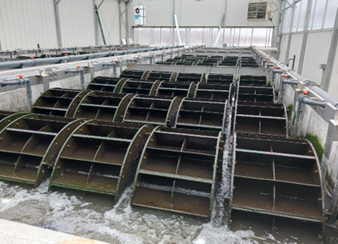
A $300,000 grant supported the project, and key partners include the City of New Albin, Upper Explorerland Regional Planning Commission, Iowa Economic Development Authority, Iowa DNR, and Fehr Graham.
